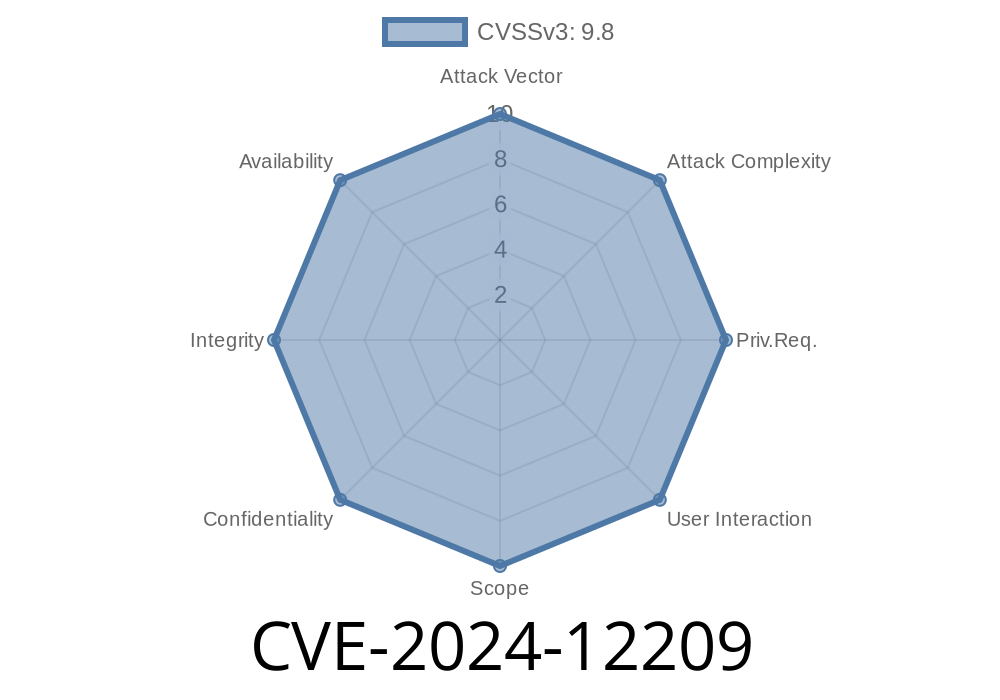In early 2024, a critical vulnerability was discovered in the WP Umbrella: Update Backup Restore & Monitoring plugin for WordPress. This plugin is often used by site administrators to automate backups and site monitoring. The vulnerability, tracked as CVE-2024-12209, exposes sites to a severe risk: unauthenticated attackers can read, execute, or even run malicious code on your server—all without logging in.
This article will break down exactly how the vulnerability works, provide code examples, link to original references, and show how attackers are exploiting sites with this bug in the wild.
What is Local File Inclusion (LFI)?
Local File Inclusion (LFI) is a vulnerability that allows attackers to trick a website into loading files from its own server. If a website runs PHP, and an attacker can control which file gets included, this can lead to code being run on the server, files being dumped to the web, or even full site compromise.
How CVE-2024-12209 Works
The vulnerable umbrella-restore action exposes a filename parameter that fails to properly check or sanitize user input. As a result, a user (even one who’s not logged in) can make the site include any local file—including ones uploaded by the attacker or sensitive config files.
Here’s what a vulnerable handler might look like
// Pseudocode for the vulnerable action
if ($_POST['action'] === 'umbrella-restore') {
$filename = $_POST['filename'];
// NO real sanitization or validation!
include($filename); // Dangerous!
}
What Goes Wrong
- No sanitization: Attackers can input ../../../../etc/passwd or the location of an uploaded PHP shell.
Preparation
1. Upload a PHP shell (masquerading as an image or backup file) into any directory the server can reach (often /wp-content/uploads/).
2. Craft a POST request to the plugin’s AJAX handler, setting action to umbrella-restore and filename to the path of the shell.
Example Attack (with cURL)
curl -X POST https://vulnerable-site.com/wp-admin/admin-ajax.php \
-d 'action=umbrella-restore&filename=../../uploads/2024/05/php-shell.php'
Unauthenticated: No login needed. Anyone can attack.
- Easy to exploit: Attackers only need a path to a file. They can start with known sensitive files, and escalate if uploads are permitted.
What Should I Do?
1. Upgrade WP Umbrella Immediately. The developers have released a patched version after 2.17.. Download the latest version here.
2. Audit your uploads/ directory. Look for suspicious files, especially ones ending in .php.
3. Monitor for suspicious POST requests. Check your logs for action=umbrella-restore from unknown sources.
References and Further Reading
- Original WPScan Advisory
- NIST NVD Entry for CVE-2024-12209
- Plugin Changelog
Sample Detection Snippet
If you want to check for signs of this attack on your server, you could look for POST requests like these in your logs:
grep "action=umbrella-restore" /var/log/apache2/access.log
Or, if you're using a WAF, add a rule that blocks this action unless the request comes from an authenticated admin.
In Conclusion
CVE-2024-12209 is a textbook example of how dangerous LFI bugs can be—especially when plugins expose powerful features without proper security checks. If you use WP Umbrella, upgrade immediately. Never underestimate what an unauthenticated file inclusion can do to your site.
Timeline
Published on: 12/08/2024 06:15:04 UTC
